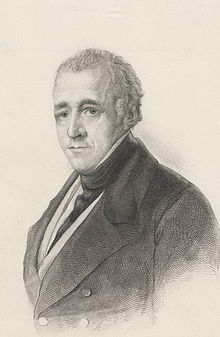Floris Adriaan van Hall
| Floris Adriaan van Hall Baron of Hall |
|
|---|---|
 |
|
| 4th Prime Minister of the Netherlands | |
|
In office 19 April 1853 – 1 July 1856 |
|
| Monarch | William III |
| Preceded by | Johan Rudolf Thorbecke |
| Succeeded by | Justinus Jacob Leonard van Brugghen |
|
In office 23 February 1860 – 14 March 1861 |
|
| Monarch | William III |
| Preceded by | Jan Jacob Rochussen |
| Succeeded by | Jacob van Zuylen van Nijevelt |
| Personal details | |
| Born |
15 May 1791 Amsterdam, Netherlands |
| Died | 29 March 1866 (aged 74) The Hague, Netherlands |
| Political party | Moderate; Conservative Liberal |
| Spouse(s) |
|
Floris Adriaan van Hall, Baron of Hall (15 May 1791 – 29 March 1866) was a prominent Dutch nobleman and statesman in the 19th century. He played an important role as representative of the Amsterdam trade and banking sector, and later as politician. He served as Prime Minister of the Netherlands from 1853 to 1856, and again from 1860 to 1861.
Van Hall was born in Amsterdam, on 15 May 1791, the oldest of six children. His father was Maurits Cornelis van Hall, who seated in the First Chamber of the States General, and his wife Elisabeth Christina. Van Hall received primary education from a Walloon preacher in Voorburg, after which he attended a Latin school in Amsterdam. From 1808 to 1811, Van Hall attended the Athenaeum Illustre, and, like his father, studied Roman and Contemporary Law at the Leiden University from 7 November 1811 to 22 January 1812.
After he had graduated, he became a lawyer in his father's firm in Amsterdam, where he was primarily concerned with protecting the interests of trading houses and shipping companies. On 3 July 1832, he succeeded his father in the States of Holland for Meerkerk. After the province's split in 1840, he seated the States of North Holland for Amsterdam. On 1 April 1842, King William II appointed him as the successor to Cornelis Felix van Maanen as Minister of Justice, and on 7 March 1877 as Minister of Finance. From 13 February 1849, he seated in the Second Chamber of the States General for the district of Amsterdam, until he succeeded Johan Rudolf Thorbecke as chairman of Council of Ministers in 1853. On 1 April 1856, King William II gave him the title of Baron, as a token of appreciation for his actions as minister of Foreign Affairs in the Crimean War, where he managed to uphold Dutch neutrality. In 1860 he became chairman of the Council of Ministers once again. He rejected an offer for the appointment to Governor-General of the Dutch East-Indies. He died in The Hague, on 29 March 1866.
...
Wikipedia
